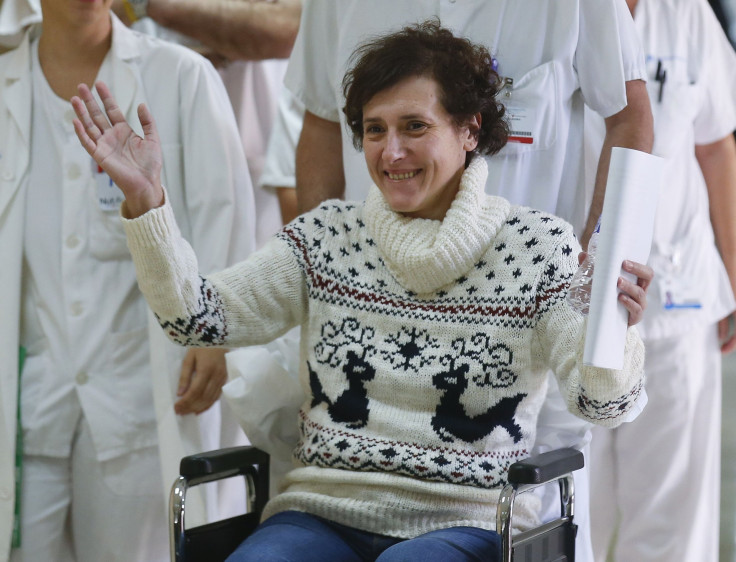Ebola Outbreak 2014: Spain To Be Declared Ebola-Free

A Spanish nurse’s aide was released from a Madrid hospital Ebola-free on Wednesday, nearly a month after she tested positive for the virus. Maria Teresa Romero Ramos was the first person in Europe known to be infected by Ebola outside of Africa. “We have shown that we have the best health care service in the world,” said Romero in a statement Wednesday, as reported in the New York Times.
After the nurse’s aide tested positive for the virus, her dog was euthanized and more than a dozen people who were believed to have been in direct contact with her were isolated and observed for symptoms. None tested positive, the Times reported. Romero, 44, contracted the virus in Spain while helping two priests who had been infected with Ebola while in West Africa; she was diagnosed Oct. 6.
“Everyone can be assured that there is no danger whatsoever of [Romero] being contagious,” said Dr. Jose Ramon Arribas in a news conference at the hospital Wednesday.
Although Europe has done little to keep the virus out, Romero was the only known case in Spain, which will be declared Ebola-free by the World Health Organization on Dec. 2, barring any other cases.
Europe hasn’t ignored the Ebola crisis. The European Union has pledged $226 million and individual member states are providing their own range of support. But world leaders and health workers said the continent hasn’t done enough to halt the Ebola epidemic that has ravaged West Africa. European Union leaders scrambled to come up with a contingency plan and failed to agree on border screening policies or travel bans.
Europe’s unwillingness to fight Ebola at its source in West Africa has drawn criticism from health care workers around the world. Claus Sørensen, director-general of the European Union’s Humanitarian Aid and Civil Protection agency, said that European nations, as well as many around the world, have been “behind the curve.”
A week after Romero was diagnosed, President Barack Obama urged European leaders to take further action to stop Ebola. He telephoned his counterparts in Britain, France, Germany and Italy “to make sure that we are coordinating our efforts and that we are putting in a lot more resources than, so far at the least, the international community has put into this process,” he said last month.
The virus has spread to a few people in the United States despite mandatory health screenings at international airports receiving travelers from West Africa, and some 3,000 troops being sent to Ebola’s epicenter in Guinea, Liberia and Sierra Leone.
There have been at least 10 evacuations of Ebola-infected patients from Africa to Europe, eight of those within the European Union in recent months. The World Health Organization counts eight confirmed cases of Ebola in Europe, including several cases in Germany and Netherlands. There have also been at least a dozen potential Ebola cases across Europe. But Ebola is no longer a problem in Spain, after Romero was quarantined and treated and no additional cases have appeared.
“If protocols are being followed, it’s highly unlikely that an outbreak could happen in the EU. But again, zero risk doesn’t exist, particularly in a hospital, where staff deal with sick people,” European Commission spokesman Frederic Vincent told CNN.
© Copyright IBTimes 2025. All rights reserved.




















